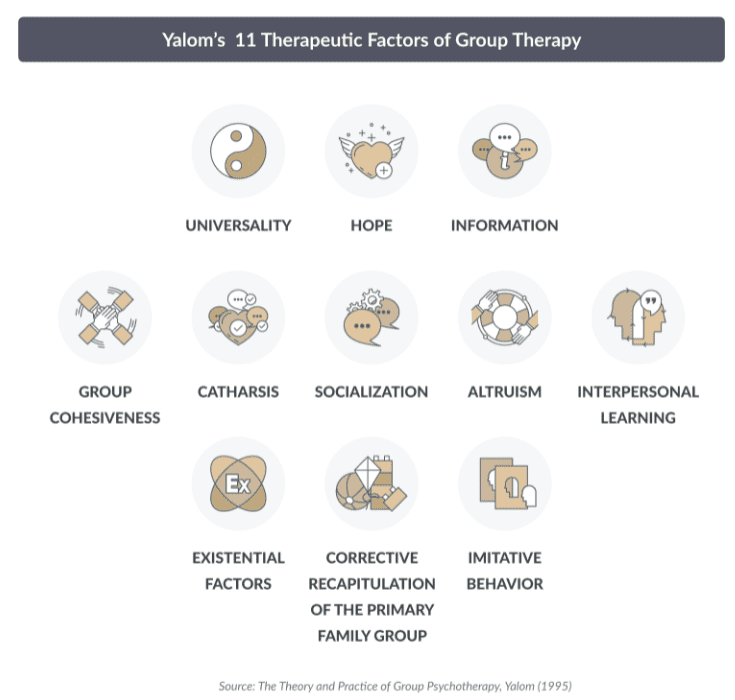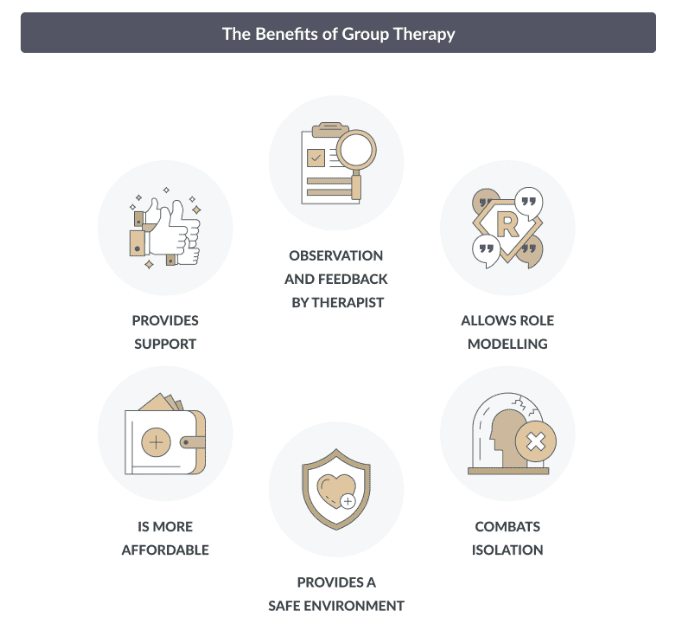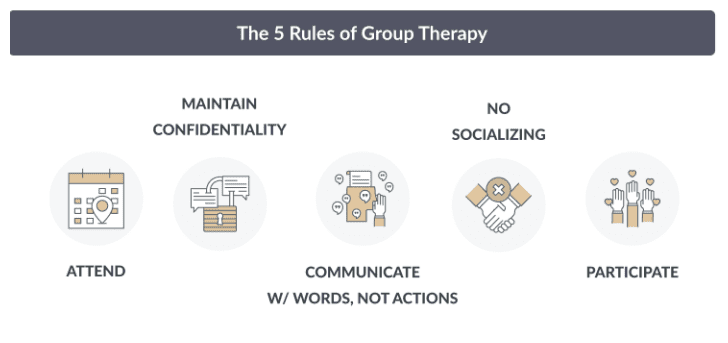What Is Process Group Therapy & How Does It Help in Recovery
It can be easy to slide into isolation when you are feeling down, especially for those who struggle with mental issues. Loneliness and isolation tend to create more loneliness and isolation, but making the effort to connect with others is exactly the thing we may need to start feeling better. As uncomfortable as it may sound, sometimes sharing difficult thoughts and feelings in the right group meeting can be the right solution. Process group therapy involves a gathering of peers who are also in recovery and a facilitator to help guide the sessions. These are called “process” groups because the therapist is overseeing a long-term treatment progression where one session builds upon the other.

What is Group Therapy?
Group Therapy is a type of psychotherapy that involves several people and one or more therapists leading the session. Process group therapy involves a gathering of peers who are also in recovery and a facilitator to help guide the sessions. These are called “process” groups because the therapist is overseeing a long-term treatment progression where one session builds upon the other.
This form of therapy is utilized in many different treatment centers, such as Overland IOP in Los Angeles, California, as part of a comprehensive treatment plan that includes individual therapy and medication. In a group therapy session, clients practice personal interaction with other individuals who share similar experiences. Individuals participate in exercises that encourage communication between one another in order to process, cope, and grow.
In a group therapy session, a licensed mental health professional supervises and guides the interactions. They will often set ground rules designed to facilitate the conversation and help clients connect with one another. Groups are mainly constructed with individuals who share the same disorder or similar experiences. The process of sharing personal stories and learning from one another is the foundation of an effective group therapy session.
Group therapy is usually a complement to individual therapy, although it can be used as a stand-alone treatment for certain issues or problems.
According to one of the most renowned group therapists, Dr. Irvin D. Yalom, there are 11 key principles of group therapy.

Principles of group therapy:
- Instilling hope
Since group therapy often includes clients at different stages in their treatment, some of the newer clients can find encouragement from seeing the positive impacts on clients further along in their treatment. - Universality
Just being part of a group of people who understand what you are going through and have experienced similar problems will help clients see that they are not alone, and that suffering is universal. - Imparting information
Group members can be a great resource for information. - Altruism
Group therapy gives members a chance to practice altruism by helping others in the group, an experience that will likely help them as well. - The corrective recapitulation of the primary family group
This wordy principle refers to the process of clients learning and exploring their childhood experiences, personalities, behaviors and feelings, and learning how to identify and avoid destructive or non-helpful behaviors. - Development of socialization techniques
The simple experience of working in a group provides excellent opportunities to socialize, practice new behaviors, and experiment in a safe environment - Imitative behavior
Clients can observe and imitate or model positive and helpful behaviors toward others in the group, including the therapist. - Interpersonal learning
Interacting with the therapist and other group members and receiving feedback can help a client learn more about themselves. - Group cohesiveness
Group therapy sessions can facilitate a shared sense of belonging and acceptance of one another. - Catharsis
This principle is based on the healing powers of sharing with others; talking through your feelings and experiences in a group can help relieve pain, guilt, and stress. - Existential factors
Although group therapy offers guidance and support through the group, it also helps clients realize that they are responsible for their own actions and the consequences that follow - This set of principles makes it clear that there are many advantages to working with a group rather than individually. While some of these principles may apply to individual therapy, most of them require a group setting.
Types of Therapy Groups

The general tone and direction of the group therapy session will vary depending on the type of group. There are many different kinds of groups with different areas of focus, but they generally fall into one of two categories.
Different kinds of groups with different areas of focus generally fall into one of two categories:
- Psychoeducational – These groups are intended to provide members with the information they need to address or cope with whatever it is that brought them to the group; they are usually structured with specific topics or modules to cover.
- Process-Oriented – These groups are more focused on experience, sharing with one another, and making connections; discussion among the members dominates this group rather than a set agenda (GoodTherapy, 2013).
Groups can be further broken down by discussion topics and the structure of the group itself.
Some of the most common therapy groups:
- Self-Help Groups – These are generally led by someone who is not a professional group facilitator, but has struggled with or successfully overcome or addressed a problem, and wishes to help others through the process.
- Medication Groups – The focus of these groups is on compliance with prescribed medication; the intent is to educate clients about their medication, ensure compliance with the doctor’s instruction and decrease their sense of isolation.
- Interpersonal Therapy Groups – This type of group is intended to dive deeper into the clients’ current relationships to understand current problems; the focus of these groups is on the present rather than the past.
- Encounter Groups – These groups aim to immerse members in potentially uncomfortable and intense group situations in the hopes of provoking greater change than a typical therapy group.
- Psychodrama – This unique type of group therapy is based on members acting out significant portions of their life. These dramatic reenactments can provoke strong emotions, which are discussed after each “scene” .
There are two kinds of group therapy sessions
- Open groups: new participants are welcome to join the sessions at any time; for example, Alcoholics Anonymous is an open session that invites new members to join in any session.
- Closed groups: the therapy sessions are closed to a core group of participants; new participants may only be welcomed when a new group is formed.
In terms of what will actually happen in a group therapy session, sessions can vary based on the topic, participants, and treatment progress, but these are some of the common features:
- The participants will meet in a room with chairs formed into a large circle.
- The session may begin with group members introducing themselves and explaining why they are in therapy.
- In subsequent sessions (in closed groups) or in every session (in open groups), members may also share their progress and any updates since the previous group meeting.
The flow of the session will depend on the same factors described above, but will likely follow one of these general paths:
- Free-form: each participant will engage with the group as much or as little as s/he wants, and participants are the main drivers of the discussion with facilitation and guidance from the therapist.
- Planned: in other cases, the therapist may have a set agenda for the meeting with planned activities and skill-building exercises for group members to engage in (Cherry, 2017).
Benefits of Group Therapy
For participants, there are many reasons why group therapy is a treatment worth considering.
The main advantages of group therapy:
- It allows participants to receive support and encouragement from other members of the group, helping them to feel less alone or isolated.
- Group therapy provides an opportunity for group members to act as role models for other members, especially when the group is composed of participants at different stages of treatment. Even if all participants are at the same stage, some participants will naturally be more successful at managing certain types of problems than others, and group members can share their experiences and learn from each other.
- It is usually more affordable than individual treatment since the therapist’s time is shared with other clients.
- Group therapy provides a safe environment for group members to practice new behaviors without fear of judgment.
- Interacting with others in group therapy will help the therapist to see first-hand how a client interacts with others and behaves in a social situation, allowing the therapist to provide targeted feedback and suggestions to each client

What Happens in a Process Group?
In a process group, 5-10 individuals meet face-to-face and share their struggles and concerns in the presence of a trained group therapist. The first few sessions in group therapy involve establishing trust. At the direction of the therapist, everyone usually gives an introduction and states his/her present concerns. After a few sessions, everyone should be comfortable enough with each other so that they can open up, share their feelings, and start developing meaningful relationships. In these meetings, participants regularly express their emotions and discuss current problems with the group, who then agree or disagree with the thoughts or actions of the person leading the conversation. Members are provided the opportunity to receive perspectives, support, encouragement, and feedback from multiple people in a safe and confidential environment. Group members often gain a deepened self-awareness regarding their relationships with others and leave group therapy feeling empowered.
Process groups are a form of group therapy that comprises an essential component of addiction treatment therapy. They allow people to learn the skills needed to navigate social networks and stress and reduce the inducements to use mood-altering substances again. Learning the skills offered from process groups can be a long progression, but the benefits are worth it.
It can be easy to slide into isolation when we’re feeling down, especially for those suffering from an invisible illness or problem, but this is the exact opposite of the action that is most likely to help us climb out of that pit.
Guidelines and Rules

Whatever type of group therapy you attend, the general rules will likely be the same. These rules must be followed for the safety of the group and the effectiveness of the treatment. Certain types of groups may have additional rules, but there is a core set of five rules that are essential for successful group therapy.
Five rules of of group therapy:
- Maintain Confidentiality. It is essential that everything said in group therapy is kept private by all group members and leaders. Failing to adhere to this rule can undermine trust within the group and hinder members’ attempts to heal.
- Commitment to Attendance. This is another essential rule for nearly any group – it is vital that each member attend every session, arrive on time, and stay for the entire session. In addition to the absent member missing valuable information and practice, absence, late arrival, or early leaving can disrupt the group.
- No Socializing with Group Members. Group therapy is not a social activity, it is (hopefully!) a therapeutic one. Forming close friendships or other bonds with group members can interfere with group success, especially if members become hesitant to share personal information because of another group member. Friendships should be saved for after the group has disbanded.
- Communicate with Words, Not Actions. This rule could be considered the exact opposite of the standard advice storytellers receive: “Show, don’t tell!” People have different reactions to physical contact, so expressing yourself through words instead of physical actions is an important rule to follow.
- Participate. Group therapy doesn’t have much of a therapeutic effect if the members do not participate! The potential for healing and growth rests on how much group members are able to connect, share, and learn from one another. It is essential for all group members to truly participate for this treatment to be effective.

HOW OVERLAND IOP CAN HELP
Overland IOP is a facility that demonstrates personalized care to every individual that arrives here, as every person is different and has unique requirements and objectives they want to meet. Our team, at Overland IOP, offers services that range from mental health counseling to rehabilitative services for various and complex addictions. Navigating the world of recovery and healing should not be a singular undertaking, especially when such beneficial resources such as ours exist and are here to help. With the new California mental health law, quality care and support have become significantly more accessible to those that are in urgent need of mental health aid, and Overland IOP is undoubtedly one of the best facilities in the state when it comes to providing these crucial services.
Overland Intensive Outpatient is ready to provide both in-person and virtual care (Telehealth services). Help is only one call away! We work 24/7.
Published: February 15, 2021

Published: January 27, 2026
What Is DPD? Understanding Dependent Personality Disorder
Most people don’t ask, “What is DPD or Dependent Personality Disorder?” They come in feeling drained, anxious, and stuck in relationships that feel restrictive yet hard to leave. Being alone feels unsettling. Decision-making feels paralyzing. Reassurance becomes a daily necessity rather than a comfort. At Overland IOP in Los Angeles, we often see Dependent Personality […]
Read more
Published: January 18, 2026
IOP Program Requirements: What to Expect?
If you’re exploring an Intensive Outpatient Program (IOP), one of the first questions that usually comes up is simple but important: Do I qualify—and what does an IOP actually require? At Overland IOP, IOP is designed for people who need structured, consistent support for mental health and/or substance use—but who don’t require 24/7 residential care. […]
Read more
Published: December 15, 2025
Behavioral Health During the Holidays: Managing Stress, Anxiety & Emotional Triggers
Why the Holidays Are Harder Than They Look? For many people, the holiday season is portrayed as joyful and restorative. In reality, December is one of the most emotionally challenging months of the year, especially for individuals navigating mental health conditions, substance use recovery, or emotional regulation difficulties. According to the National Alliance on Mental […]
Read more
